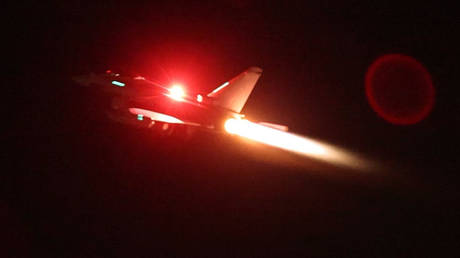ARTICLE AD BOX
The British military has joined the bombing of Yemen for the second time
American bombers struck Houthi installations in Yemen again on Monday, the US Central Command (CENTCOM) has said. It is the second time British bombers have taken part in the operation, now dubbed ‘Poseidon Archer’.
Royal Air Force (RAF) jets based in Cyprus had been involved in the January 11 attack, while the US used cruise missiles and aircraft from the carrier USS Eisenhower. Since then, the US has carried out six more strikes on its own, reportedly targeting Houthi missiles as they prepared to launch.
US and UK forces “conducted strikes on 8 Houthi targets” in Yemen just before midnight on Monday, CENTCOM said on X (formerly Twitter). “The targets included missile systems and launchers, air defense systems, radars, and deeply buried weapons storage facilities.”
According to CENTCOM, the strikes were carried out “alongside UK Armed Forces, and with the support from Australia, Bahrain, Canada, and the Netherlands.”
Although the countries named have all pledged participation in the US-led ‘Operation Prosperity Guardian’, aimed at ensuring the safety of international shipping, the US military insisted that the strikes were “separate and distinct from the multinational freedom of navigation” operation.
Read more US names Yemen operation – CNN
US names Yemen operation – CNN
Earlier on Monday, CNN reported that the Pentagon has named the strike mission ‘Operation Neptune Archer,’ suggesting a long-term US commitment to bombing the Houthis. The Washington Post reported over the weekend that the US objective was to “degrade and destroy their capabilities,” citing officials who wanted to remain anonymous.
CENTCOM has accused the Houthis of “reckless and unlawful attacks on US and UK ships as well as international commercial shipping in the Red Sea, Bab Al-Mandeb Strait, and the Gulf of Aden.”
The attack comes after the call between US President Joe Biden and British Prime Minister Rishi Sunak, in which they discussed the situation in Yemen.
The Houthis announced in late October that they would strike all Israeli-linked shipping in the Red Sea until the blockade of Gaza is lifted, and have since targeted several merchant vessels. After the January 11 strikes, they expanded the target list to British and American ships as well.
Houthi attacks have impacted the global shipping industry more than the Covid-19 pandemic, the maritime advisory firm Sea-Intelligence said last week. Roughly 15% of the world’s sea trade passes through the region.
Facing the rising insurance premiums, major Western carriers such as Maersk, MSC, CMA CGM, and Hapag-Lloyd have chosen to reroute their cargoes around Africa, which takes more time and fuel.
.png)
 1 year ago
5
1 year ago
5








 English (US)
English (US)